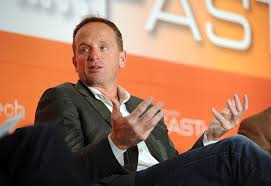Between Train Town, tennis lessons, and the finale of “Downton Abbey” (is it wrong to hope Rose is shipped to America next season?), StrictlyVC ran out of time yesterday to write today’s column. But enjoy the intel below and stay tuned for some good stuff coming this week!
—–
Top News in the A.M.
Messaging giant WhatsApp, which already has 465 million users, will add voice services in the second half of this year, says TechCrunch.
Comcast and Netflix announced an agreement Sunday in which Netflix will pay Comcast for faster and more reliable access to Comcast’s subscribers. The deal, notes the New York Times, is a “milestone in the history of the Internet, where content providers like Netflix generally have not had to pay for access to the customers of a broadband provider.”
New Fundings
Beauty Noted, an 18-month-old, Sausalito, Ca.-based company that hasn’t yet launched but superficially looks like a Pinterest for beauty products, has raised $1.7 million of a $2.2 million round, shows an SEC filing. Kate Thorp, former CEO of Real Girls Media and Lot21, is chief executive.
Bigtincan, a three-year-old, Waltham, Ma.-based maker of mobile content software, has raised $5 million in its first round of venture capital led bySouthern Cross Venture Partners.
Carwow, a 3.5-year-old, U.K.-based, new car buying platform, has raised $2.8 million in seed funding led by Balderton Capital, which was joined byEpisode 1 Ventures, Samos Investments, and numerous individual investors.
Changers, a four-year-old, Berlin-based startup that turns eco-friendly behavior into a game, has closed $1.5 million in Series A financing. The German government-backed fund BFB Frühphasenfonds Brandenburgled the round, says TechCrunch, with participation from clean energy specialist Heliocentris and other, unnamed private investors.
ClubLocal, a 3.5-year-old, Encino, Ca.-backed platform to book and buy household services like plumbing, has closed $10.7 million in funding. Investors include Groupon and numerous individual investors.
CourseHorse, a three-year-old, New York-based startup that helps people locate and enroll in local classes (beginning in New York City) has raised $3 million in new funding, shows an SEC filing. The company has raised $3.5 million to date, including from New York Angels and Golden Seeds.
eCommera, a 6.5-year-old, London-based company that offers advisory, support and software services to retailers that are developing and operating e-commerce businesses, has raised $41 million in Series C funding led by Dawn Capital. Other participants in the round includedWest Coast Capital, Frog Capital, ePlanet Capital, WPP and new partner Wti. The company has raised at least $51.4 million to date, shows Crunchbase.
GC Aesthetics, a 6.5-year-old, Dublin, Ireland-based maker of breast implants, has raised $60 million led by OrbiMed Advisors, which contributed $40 million. Another $20 million came from Montreux Equity Partners and Oyster Capital. The company has raised $90 million to date.
Granular, a 4.5-year-old, San Francisco-based maker of cloud software and analytics for farmers (that was formerly called Solum), has raised $4.2 million from Andreessen Horowitz, Google Ventures and Khosla Ventures. No financial terms were disclosed, but the company disclosed at the same time that Monsanto Company has bought its soil science business. Granular has raised roughly $28 million so far, according to Crunchbase.
Hubub, a 4.5-year-old, New York-based online community platform whose visitors gather around user-generated topics, has raised $8.5 million in Series A funding. The investors included Edgar Bronfman, Jr.; Todd Ruppert, the former CEO of T. Rowe Price Global Investment Services; and Tom Kalaris, former CEO of Barclays Wealth & Investment Management.
Kerecis Limited, a 6.5-year-old, Isafjordur, Iceland-based emerging tissue-regeneration company, has raised $2 million in the A3 series funding fromNSA Ventures, Iceland government’s venture capital fund; Omega3 ehf, an investment fund affiliated with London-based Novator; Capital ehf; 1924 ehf; Skógur ehf; Klofningur ehf; and Hradfrystihusid-Gunnvor hf. The company’s technology takes decellularized fish skin that has had all its cells and antigenic materials removed and applies it to areas of tissue damage where it recruits the body’s own cells and (so goes the ultimate goal) converts it into functional, living tissue.
Magisto, a 2.5-year-old, New York-based service for creating and editing personal movies on mobile devices, has raised $2 million from Mail Ru Group. Magisto is also backed by Horizons Ventures, Magma Venture Partner, Qualcomm Ventures and SanDisk Ventures. The company has raised $20.5 million to date, according to Crunchbase.
mCASH, a 7.5-year-old, Oslo, Norway mobile payment startup, has raised $7 million in funding from Northzone and Entrée Capital. Arctic Startup has more here.
Newlans, an 11-year-old, Acton, Ma.-based company that makes an analog wideband signal processing architecture for RF semiconductor applications, has raised $15 million in Series B funding led by Intel Capital. Earlier investors Paladin Capital and Lockheed Martin Corporation also participated in the round, which brings the company’s total funding to $22 million.
Saisei, a three-year-old, Sunnyvale, Ca.-based company that makes virtual network appliances, has raised $5.6 million Series A funding round led byOxygen Ventures, which was joined by earlier, individual investors.
Seno Medical Instruments, a 8.5-year-old, San Antonio, Tx.-based medical device company that uses lasers and ultrasound to diagnose breast cancer, has raised $39 million in Series C funding led by MedCare Investment Funds, which was joined by unnamed individual investors. The company has raised at least $51 million to date.
SoundFocus, an 18-month-old, San Francisco-based company whose iOS app adjusts music based on a person’s unique abilities to hear different frequencies (and which is reportedly building a hardware equivalent of the app), has raised $1.7 million from Kapor Capital, Y-Combinator, Greg Badros, Ovo Fund, RTA Capital, Vegas Tech Fund, and individual investors.
VivaReal, a 4.5-year-old, Sao Paulo, Brazil-based real estate marketplace in Latin America that connects, buyers, sellers, and renters with properties, has raised $12.7 million in new funding, shows an SEC filing. The company has raised roughly $32 million since 2011, show filings, including from investors Valiant Capital Partners, Kaszek Ventures, Monashees Capital, and a long list of individual backers, like former eHarmony CEOGreg Waldorf.
—–
New Funds
Deep Fork Capital, a 10-year-old, San Francisco-based venture firm, is targeting $50 million for its raising a second fund, shows an SEC filing. Deep Fork was founded by Aubrey McClendon, Andre de Baubigny andTimothy Komada, who provided all the money for Deep Fork’s first fund — reportedly a $500 million pool. (McClendon, it’s worth noting, cofounded and long served as CEO of the oil and natural gas company Cheapeake Energy Corporation, whose public market cap is currently $17.7 billion.) The three came together in 2002 when Komada and de Baubigny, a former investment banker, founded a wine storage business called Vintrust that raised money from investors, including McClendon. (Vintrust reportedly ran aground in 2009.) One of Deep Fork’s newest investments is in Amplify L.A., a startup accelerator that raised $8 million in Series B funding last month.
Maven Ventures, a five-year-old, Los Altos, Ca.-based seed-stage fund focused on mobile and consumer Web startups, has raised $4.2 million, shows an SEC filing. Maven Ventures was founded by Jim Scheinman, an early employee at the social network Friendster who went on to work for two startups founded by Michael and Xochi Birch. Scheinman was first the head of biz dev at their birthday alert company BirthdayAlarm; according to his LinkedIn bio, he later became the first employee of their social network Bebo, acquired by AOL in 2008 for $850 million in cash.
Morningside Group, a 28-year-old investment group with offices in Boston, Hong Kong, Shanghai and Beijing, has raised more than $400 million in capital for three new funds, according to filings with SEC first flagged by peHUB. The documents, filed Thursday, show that the firm has raised $279 million for Morningside China TMT Fund III, $40 million for Morningside China TMT Fund III Co-Investment, and $93 million for Morningside China TMT Special Opportunities Fund. Morningside was founded by billionaire brothers Ronnie and Gerald Chan, whose Hang Lung Group is among Hong Kong’s biggest real estate companies. (Gerald Chan has reportedly acquired gobbled up more than $100 million in real estate around Harvard Square in recent years, too.) Morningside invests in both private equity and venture capital deals in North America, Europe and Asia Pacific; one of its newest portfolio companies is Cheyipai, a used car trading platform in China.
PTV Sciences (for Pinto Technology Ventures), an 11-year-old, Austin Tx.-based venture firm that seeks out growth opportunities in healthcare and life sciences, is looking to raise up to $200 million for its fourth fund, shows an SEC filing that says the first sale has yet to occur. The firm raised its last fund in 2010.
—–
IPOs
Chukong Technologies, a four-year-old, Beijing-based mobile-gaming company, hopes to raise around $150 million through a IPO in the U.S. in the second half of this year, reports Bloomberg. Chukong develops leisure games for smartphones and according to its site, “Fishing Joy,” one of its most popular games, has attracted more than 200 million users in China. The company has raised just north of $83 million, according to Crunchbase; its investors include Northern Light Venture Capital,Steamboat Ventures, Sequoia Capital, and GGV Capital.
Roku, the 13-year-old, Saratoga, Ca.-based maker of set-top boxes that connect TVs to the Internet, is weighing an IPO this year, according to Bloomberg sources, who say the company hasn’t yet selected a banker. Last May, Roku raised $60 million in new funding from Hearst and an unidentified institutional investor. They joined News Corp., British Sky Broadcasting Group, Menlo Ventures, Globespan Capital Partners and others backers who’ve collectively invested roughly $130 million in the company to date.
—–
Exits
Appslingr, a year-old, San Francisco-based startup that was incubated by the Alchemist Accelerator and has been building a system that lets people access any of their files and use any application on any device, was just acquired for an undisclosed amount by Otoy. L.A.-based Otoy is a cloud graphics company that itself just closed an undisclosed amount of Series D funding led by Yuri Milner two weeks ago. (Milner is just one of many heavy hitters associated with the company, whose board includes Google Chairman Eric Schmidt, former IBM president Sam Palmisano, and Ari Emanuel, the cofounder and co-CEO of William Morris Endeavor.) You can read more about the deal here.
Burstly, a four-year-old, Santa Monica, Ca.-based company, has been acquired by Apple for an undisclosed amount. Burstly makes an in-app ad management platform called SkyRocket that helps developers monetize their applications, and it’s the parent company of a popular mobile app testing platform called TestFlight. TechCrunch reported the news on Friday. Burstly had raised $7.3 million, according to Crunchbase, including from Upfront Ventures, Rincon Venture Partners, and SoftBank Capital.
—–
People
Herbert Allen III, who took over his family-run firm, Allen & Co., in 2002, has turned the relatively small, 180-employee bank, into a serious Silicon Valley deal maker, all without establishing a California office. Powerful friends like investors Marc Andreessen and Peter Thiel have helped.
Billionaire investor Mark Cuban made a surprise appearance at the annual “SEC Speaks” conference in Washington on Friday. Wearing a gray hoodie, Cuban, who last fall beat the SEC in a years-long case against him, “sat in the back of the large auditorium, lighting up the Twitter-sphere with lively commentary about speeches from top SEC officials,” reports Reuters.
Drive Capital, the newly closed Midwest-focused venture firm of former Sequoia partners Mark Kvamme and Chris Olsen, has named two partners to the firm: Robert Hatta and Ned Schwartz. Hatta joins as a talent partner; he was VP of talent for JumpStart Ventures, a Chicago-based seed-stage fund. Schwartz joins Drive after spending five years as an investor at Norwest Venture Partners and General Atlantic.
Todd Force, previously a CFO at the computer server company Rackable Systems, is joining the mobile software company MobileIron as CFO it prepares for an IPO, says the WSJ. MobileIron could be valued at more than $2 billion, according to the piece, which reports that MobileIron generated more than $100 million in revenue last year, according to a source.
Erin Gleason has just joined the venture firm Founders Fund as its first in-house communications person. Gleason came from the public relations firm the Hatch Agency and spent several years in public relations at Foursquare and Google before that.
On Friday, Y Combinator cofounder Paul Graham announced that he’s handing over leadership of the popular startup incubator to Sam Altman, a part-time YC partner since 2011 who also happens to have been part of the first YC startup class in 2005. (Altman’s startup, the location-based services startup Loopt, was acquired by Green Dot Corp in March 2012.) In a blog post, Graham said of the move that Altman is better equipped to continue scaling out Y Combinator. “I’m convinced there’s a fundamental change happening in the way work gets done. It’s becoming normal to start a startup.There will be a lot more startups in 10 years than there are now, and if YC is going to fund them, we’ll have to grow proportionally bigger. Of all the people we’ve met in the 9 years we’ve been working on YC, Jessica [Livingston, Graham’s wife and cofounder] and I both feel Sam is the best suited for that task.”
Futurist Ray Kurzweil, who is today Google‘s director of engineering, is profiled in his San Francisco home by The Guardian, and he tells the outlet that robots will be more intelligent than humans in 15 years. Says one critic of Kurzweil who is quoted in the piece, biologist PZ Myers: Kurzweil’s theories are a “very bizarre mixture of ideas that are solid and good with ideas that are crazy. It’s as if you took a lot of very good food and some dog excrement and blended it all up so that you can’t possibly figure out what’s good or bad.”
Peter Thiel and MIT business professor Andrew McAfee squared off last Thursday night in a public debate about technological innovation and it’s relationship to widening income inequality. “I wouldn’t mind paying more in taxes if I felt the money was being spent as well as it was spent in the ‘30s or ‘50s,” Thiel told Forbes reporter Jeff Bercovici immediately after the discussion. “I live in the Marina area in San Francisco. They built the Golden Gate Bridge in three and a half years in the 1930s, ‘33 to ‘36. They’re now building an access road to the bridge that’s taken eight years and possibly will end up costing more in inflation adjusted dollars than the whole bridge cost in the ‘30s. So it’s one of the reasons I personally don’t want to pay more taxes, because I feel the government spends the money so extraordinarily badly. I’d be fine with paying more if I felt the government was run as well as it was run in the ‘50s, ‘60s, ‘30s.”
—–
Happenings
The three-day Launch Festival kicks off today in San Francisco. The agenda features a VC panel, a keynote by Paul Graham, and, of course, lots of startup demos.
The Samsung Unpacked 2014 event is happening today in Barcelona, Spain (where Samsung is expected to unveil the highly anticipated new Galaxy S5). The Korean electronics giant kicks off the event at 8 p.m. local time (11 a.m. PST); you can check it out live right here.
Samsung Unpacked is part of the broader, four-day-long trade show Mobile World Congress in Barcelona, featuring keynotes by Facebook CEO Mark Zuckerberg, WhatsApp CEO Jan Koum, and IBM CEO Virginia Rometty, along with lots of new product announcements. (You can see a live feed here.)
—–
Data
You might not guess it, but private equity and venture capital investments were up last year over 2012, says the Latin American Private Equity and Venture Capital Association. A total of $6.04 billion was committed to Brazil, compared with $5.7 billion in 2012. Investments in Latin America also increased, to $8.9 billion, up 13 percent from the $7.9 billion in 2012. The region had 233 deals last year, a slight drop from 237 in 2012. Dealbook has more here.
—–
Job Listings
Intuit is looking for a corporate development senior analyst to help identify, evaluate and help execute on M&A opportunities. The job is in Mountain View, Ca.
—–
Essential Reads
Apple is already building its next massive business and no one seems to have noticed.
The telecom industry has convened for its biggest get-together of the year at the Mobile World Congress event. Meanwhile, it’s never been less clear what it means to be a mobile-phone company.
WhatsApp was acquired by Facebook for a stunning $19 billion last week, but when it went down on Saturday for a few hours, some of the tweets about the outage were priceless.
—–
Detours
“I had an epiphany the other day,” writes Georgetown University law professor Rosa Brooks. “I was in the middle of marking up a memo on U.S. drone policy while simultaneously ordering a custom-decorated cake for my daughter’s sixth grade musical cast party and planning my remarks for a roundtable on women in national security. Suddenly, it hit me: I hate Sheryl Sandberg.”
In his new GQ column, Momofuku founder David Chang sends a “sweet and salty valentine” to what he considers to be the most underrated meat in America: Yes, we’re talking bologna.
Tips for pulling an all-nighter.
—–
Retail Therapy
This new Garmin watch can track your progress in six different sports and deliver iPhone users notifications for calls, email and texts, among other things. Engadget says it “might be the only smart wristwear you need if your life revolves around fitness.” (To that, we say, we wish.)
Think you’ve seen everything down on Sand Hill Road? Just wait until someone pulls up in one of these jaw-droppers.
—–
To sign up for StrictlyVC, click here. To advertise, click here.








